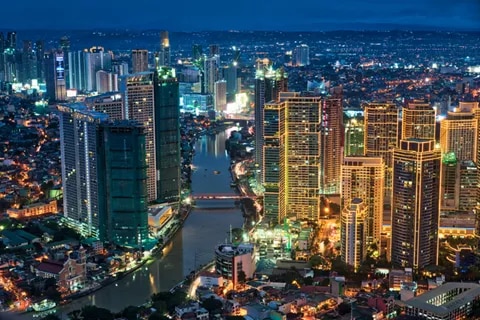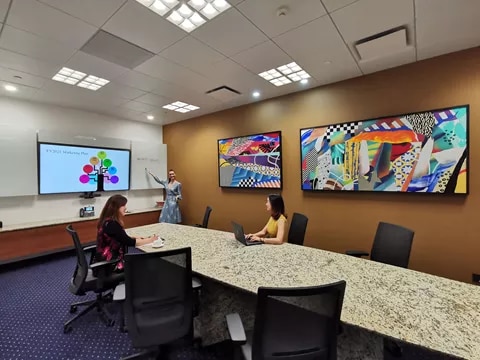
Finding the right workspace in the Philippines can make or break your business. Your office says a lot about your brand. Whether you're scaling your team, meeting clients, or building credibility, the workspace you choose matters.
While traditional office costs have remained relatively flat, flexible workspace options have grown drastically in recent years across Bonifacio Global City, Makati, and emerging business districts in Cebu and Davao. That means you have more choices than ever before- the real challenge lies in knowing which one fits your business needs and budget.
This guide cuts through the confusion, where we'll help you assess your requirements, compare workspace types, and use a practical checklist to make a confident, cost-effective decision that supports your growth.
Understand Your Business Needs
Before touring any workspace Philippines options, take stock of what your business actually requires. Start with your team size and where you expect to be in 12 months. For instance, a two-person consultancy has vastly different needs from a 15-member creative agency.
Next, consider various work styles within your company. You might need quiet areas with acoustic separation for focused work. Or perhaps open spaces and communal areas for brainstorming sessions work better. Client-facing businesses require professional meeting rooms and a polished reception area. Tech startups often prioritize high-speed internet and 24/7 on-demand access over fancy lobbies. Different tasks require different environments, with the goal being to allow employees to choose their work location based on their needs can enhance productivity significantly.
Think about frequency too. Daily office users value amenities like parking and nearby restaurants more than teams who gather twice weekly. Location accessibility becomes crucial. Your Quezon City-based team won't appreciate a daily commute to Alabang, regardless of how impressive the facilities might be.
Here's a Tip: If you're still testing your business model, consider coworking spaces or virtual offices before committing to long-term leases.
Know Your Workspace Options in the Philippines
The Philippine workspace landscape offers four main categories. Each serves different business stages and styles:
|
Type
|
Ideal For
|
Pros
|
Cons
|
|
Coworking Spaces
|
Freelancers, startups
|
Hot desks, assigned desks, networking, cost-effective
|
Open plan layout reduces privacy
|
|
Serviced Office
|
SMEs, expanding teams
|
Private offices, office furniture included, reception support
|
Higher overhead expenses
|
|
Virtual Office
|
Remote employees, distributed teams
|
Professional address, meeting spaces on demand
|
No permanent office space
|
|
Traditional Office Space
|
Established companies
|
More control over office environment, dedicated conference rooms
|
High upfront costs, long maintenance burden
|
Coworking spaces have transformed from trendy hangouts into serious business hubs with compelling advantages. Beyond hot desking options, many now offer assigned desks and private offices within shared office environments. Most flexible workspaces concentrate in Manila's business districts. You'll also find growing presence in Cebu IT Park and Davao's Lanang area. These flexible office spaces create opportunities for informal meetings and collaboration between different companies.
Serviced offices bridge the gap between workplace flexibility and professionalism. These flexible offices include office furniture, utilities, high-speed internet, and often reception support services. International businesses establishing Philippine operations favor them. Local SMEs wanting premium addresses without the maintenance burden of traditional offices also find them attractive.
Virtual offices provide business registration addresses, mail handling, and on-demand access to meeting spaces and project rooms. They work perfectly for e-commerce businesses, consultants, and remote-first companies. These solutions offer professional credibility while supporting remote work arrangements.
Traditional office space still works for established businesses ready for 3-5 year commitments. However, factor in office building maintenance, fit-out costs, and utility deposits. Consider the time needed to create your ideal work environment too.
Checklist: What to Look For in Your Next Office
Location & Accessibility
Your workspace location impacts everything from employee satisfaction to client impressions. Prioritize areas near train stations or major transport hubs. Business districts like Ortigas, Makati CBD, and BGC offer prestige along with higher costs. Emerging areas like Bridgetowne or Arca South provide better value while maintaining accessibility.
Check parking availability and costs. Manila's parking shortage can frustrate employees and clients alike. Nearby amenities matter too. Banks, restaurants, convenience stores, and healthcare facilities save your team time and boost satisfaction.
Budget & Hidden Costs
Look beyond monthly rent. Calculate your total occupancy costs. Include association dues and CUSA (common utilities and services). Verify internet speeds match business-grade requirements. Factor in electricity, water, and air conditioning charges. Don't forget cleaning and maintenance fees. Traditional leases typically require 2-3 months security deposit. Bare units need fit-out expenses too.
Flexible workspaces often bundle these costs. This makes budgeting more predictable. Traditional leases might seem cheaper initially. Yet escalation clauses and unexpected charges can surprise you later.
Flexibility of Terms
Business conditions change rapidly, requiring flexible workspace solutions. You need to scale up when landing major clients. Sometimes you must downsize during lean periods. Flexible workspace providers typically offer flexible contracts with month-to-month or short-term agreements. This allows businesses to adapt quickly. Traditional offices lock you in, though some might negotiate break clauses after the first year.
Ask about expansion rights within the same office building. Growing companies benefit from providers who can accommodate your team's evolution. Moving from 2-person private offices to 50-seat floors without relocation hassles supports equal opportunities for growth across all departments.
Technology & Internet Reliability
Philippine internet has improved dramatically. Yet consistency varies by location and provider. Verify backup connections exist. Redundant lines prevent productivity losses during outages. Check if the building has fiber optic infrastructure. Generator backup for power interruptions matters too.
Test actual speeds during peak hours. Marketing materials might promise 100Mbps. Shared connections during busy periods tell different stories. For tech companies and BPOs, this becomes absolutely essential.
Amenities & Facilities
Essential amenities vary by business type, yet all support employee performance and well-being. Client-facing companies need professional meeting rooms and conference rooms with video conferencing capabilities. Creative teams value breakout areas, open spaces, and project rooms for collaboration. Everyone appreciates functional pantries and clean restrooms. Natural light and adequate air conditioning help increase productivity.
Building management quality matters significantly for your office. Well-maintained office buildings with responsive property managers prevent small issues from becoming major disruptions. Check the building's track record. How they handle concerns and emergencies directly impacts employee engagement and retention.
Community & Networking Opportunities
Coworking spaces excel at creating communities. Regular networking events happen frequently. Workshops and social gatherings can generate partnerships, clients, and talent connections. Even serviced offices increasingly offer community programs. Evaluate whether these align with your business goals or simply add noise to your workday.
Legal & Compliance Requirements
Verify that your chosen workspace allows business registration with DTI, SEC, and BIR. Some residential-zoned buildings complicate official registration. Informal arrangements create similar problems. Virtual offices should provide necessary documentation for business permits and government requirements.
Check barangay permit requirements. Ensure your workspace provider can support your compliance needs. Professional operators handle these smoothly. Informal arrangements often hit roadblocks.
Here's the checklist at a quick glance:
Location & Accessibility
-
Is the office near train stations, bus routes, or major transport hubs?
-
Is the location convenient for employees and clients?
-
Does it offer the right balance between prestige and cost?
-
Is parking available and reasonably priced?
-
Are there nearby amenities such as banks, restaurants, convenience stores, and healthcare facilities?
Budget & Hidden Costs
-
Have you calculated total occupancy costs (rent + association dues + utilities)?
-
Are electricity, water, air conditioning, and cleaning fees included or separate?
-
Have you verified actual internet performance and any upgrade costs?
-
Have you factored in deposits (2–3 months typical for traditional leases)?
-
Are there fit-out or renovation costs for bare units?
-
Have you reviewed escalation clauses or potential hidden charges?
-
If choosing flexible workspaces, are costs bundled and predictable?
Flexibility of Terms
-
Does the lease allow short-term or month-to-month options?
-
Can you easily scale up or down as your business changes?
-
Are there break clauses in long-term leases?
-
Can you expand within the same building or provider network?
-
Will relocation be hassle-free if you need more space later?
Technology & Internet Reliability
-
Does the building have fiber optic internet infrastructure?
-
Are redundant or backup internet lines available?
-
Is there generator backup for power interruptions?
-
Have you tested internet speeds during peak hours?
-
Does the provider guarantee consistent, business-grade connectivity?
Amenities & Facilities
-
Are meeting and conference rooms equipped with video conferencing tools?
-
Are breakout areas or creative spaces available for collaboration?
-
Are pantries, restrooms, and common areas clean and well-maintained?
-
Does the office have good natural light and reliable air conditioning?
-
Is the building management responsive and proactive about maintenance?
-
Does the property have a solid reputation for safety and reliability?
Community & Networking Opportunities
-
Does the workspace host networking events, workshops, or training sessions?
-
Are community programs relevant to your business or industry?
-
Is the environment collaborative or potentially distracting?
-
Does the community add value?
Legal & Compliance Requirements
-
Can the workspace address be used for DTI, SEC, and BIR registration?
-
Is the building in a commercially zoned area?
-
Does the provider supply necessary documents?
-
Can the workspace assist with barangay permits and local compliance?
-
Is the provider experienced with business registration processes?
Common Mistakes SMEs Make When Choosing a Workspace
Focusing only on rent cost, ignoring total expenses That ₱15,000 monthly rent becomes ₱25,000 after adding utilities, internet, parking, and association dues.
How to avoid: Request a detailed breakdown of all charges and fees upfront.
Signing long leases too early Startups often overestimate space needs or underestimate growth. This leaves them stuck with unsuitable spaces.
How to avoid: Start with flexible terms until your business model and team size stabilize.
Ignoring location impact on employees Cheap office space in traffic-heavy areas leads to tardiness and exhaustion. Eventually, this causes turnover.
How to avoid: Survey your team about commute preferences before deciding.
Overlooking scalability needs That perfect 10-seat office becomes cramped when you hire five more people six months later.
How to avoid: Choose providers who can accommodate growth within the same building.
Missing hidden service charges Some buildings charge separately for garbage collection, security, and even holiday decorations.
How to avoid: Review contracts carefully. Ask current tenants about their actual monthly bills.
How to Future-Proof Your Workspace Choice
The pandemic permanently changed workspace expectations. It accelerated the shift toward workplace flexibility. Hybrid work has become the new normal for Philippine businesses. Employees expect options for both in-office collaboration and remote work.
Choose spaces that support this balance. You might need fewer assigned desks combined with more meeting spaces. Virtual office services paired with on-demand access to private offices and conference rooms could work better. The right mix depends on your specific needs.
Technology infrastructure becomes increasingly critical. Workers and distributed teams rely heavily on cloud services and video conferencing. Office buildings with future-ready tech capabilities position your business for success. Look for high-speed internet and smart access systems. This technology support enables seamless collaboration whether employees work in-office or remotely.
Sustainability and well-being features enhance productivity while reducing costs. Energy-efficient buildings cut overhead expenses. They also appeal to environmentally conscious employees and clients. Natural light exposure improves mood and focus. Outdoor spaces provide mental breaks. Quiet areas enable focused work. These features have evolved from nice-to-have perks into standard expectations. They matter for attracting top talent and improving employee retention.
Take Action on Your Workspace Decision
Choosing the right workspace balances cost, flexibility, and credibility. It must support your team's productivity and growth ambitions. Use this checklist to evaluate options systematically. Avoid falling for glossy marketing materials or prestigious addresses that don't serve your actual needs.
Remember that the perfect workspace evolves with your business. What works for your five-person startup might not suit your 20-person scale-up. Build flexibility into your plans. Regularly reassess whether your workspace still aligns with your business goals.
Ready to find your next workspace? Start by shortlisting providers that offer flexible terms, professional amenities, and locations that fit your business needs. Tour at least three options. Bring this checklist. Involve key team members in the decision-making process. Your next workspace serves as the launchpad for your business growth in the Philippines.
Frequently Asked Questions






